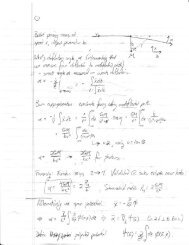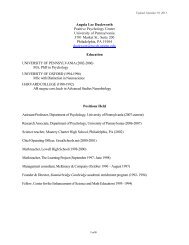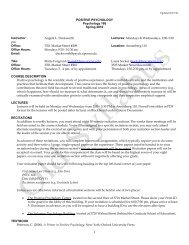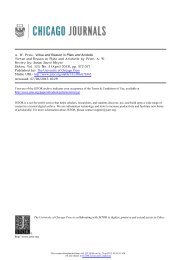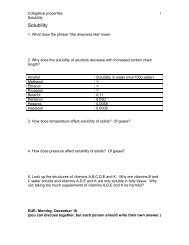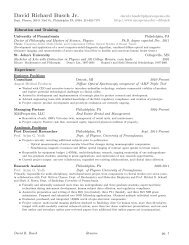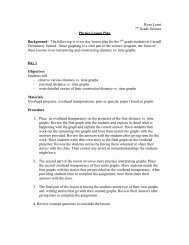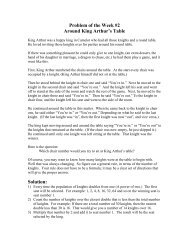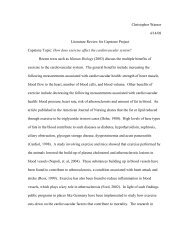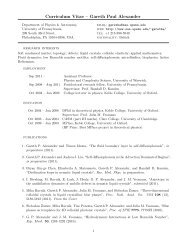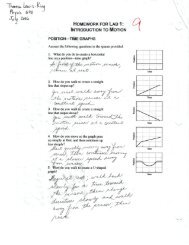PENN SUMMER - University of Pennsylvania
PENN SUMMER - University of Pennsylvania
PENN SUMMER - University of Pennsylvania
You also want an ePaper? Increase the reach of your titles
YUMPU automatically turns print PDFs into web optimized ePapers that Google loves.
Course Listings<br />
12-week Summer Session<br />
MAY 24-AuGusT 13, 2010<br />
anThroPoloGY<br />
anTh 247 900 s 9:00am–12:10pm schuyler<br />
Archaeology Laboratory Field Project<br />
Crosslisted with: ANTH 747 900<br />
This course is a summer version <strong>of</strong> ANTH 220. In summer more<br />
emphasis will be placed on field visitations. Course open to all students;<br />
no instructor permission needed. Course may be repeated for<br />
credit and students may take both ANTH 247 and 220. Questions:<br />
contact Robert L Schuyler; schuyler@sas.upen.edu; 215.898.6965;<br />
<strong>University</strong> Museum 412/6398.<br />
AdditionAl Section:<br />
ANTH 247 901 s 1:00pm–4:00pm schuyler<br />
Archaeology Laboratory Field Project<br />
BioloGiCal BaSiS oF BehaVior<br />
BIBB 269 900 M 5:00pm–8:10pm heerding/Yee<br />
Autonomic Physiology<br />
Prerequisite(s): BIBB 109<br />
This lecture course is designed to introduce the student to the functioning<br />
<strong>of</strong> the autonomic nervous system (ANS), which is critically<br />
involved in the maintenance <strong>of</strong> body homeostasis through regulation<br />
<strong>of</strong> behavior and physiology. The course will begin with a review <strong>of</strong> the<br />
basic anatomy and physiology <strong>of</strong> the ANS including the sympathetic,<br />
parasympathetic, and enteric divisions. The mechanisms by which the<br />
ANS regulates peripheral tissues will be discussed, including reflex<br />
and regulatory functions, as will the effect <strong>of</strong> drugs which modulate<br />
ANS activity. The role <strong>of</strong> the ANS in regulating behavior will be addressed<br />
in the context <strong>of</strong> thirst, salt appetite and food intake. Finally,<br />
the course will cover the result <strong>of</strong> over-activation <strong>of</strong> the sympathetic<br />
nervous system as manifested in chronic stress.<br />
BIBB 475 900 T 5:30pm–8:40pm lexow<br />
Neurodegenerative Disease<br />
This course will familiarize students with advances in our understanding<br />
<strong>of</strong> the clinical features and pathogenesis <strong>of</strong> a wide range <strong>of</strong><br />
neurodegenerative diseases, including Alzheimer’s disease and other<br />
dementias, prion diseases, Parkinson’s disease and atypical parkinsonisms,<br />
neurodegenerative ataxias, motoneuron diseases, degenerative<br />
diseases with chorea, iron and copper disorders, and mitochondrial<br />
diseases. Students will analyze original research reports on a<br />
range <strong>of</strong> proposed pathological cellular processes that may represent<br />
steps in cell death pathways leading to neuron loss seen in these dis-<br />
eases. Significant emphasis will be placed on the fast-expanding field<br />
exploring genetic contributions to neurodegenerative disease, as<br />
identification <strong>of</strong> genetic mutations pathogenic for familial neurodegenerative<br />
diseases has been a major driving force in neurodegenerative<br />
research and pointed researchers towards essential molecular<br />
process that may underlie these disorders. Strategies for therapeutic<br />
intervention in the management, prevention, and cure <strong>of</strong> neurodegenerative<br />
disease will be addressed.<br />
BIBB 480 900 r 5:30pm–8:40pm lexow<br />
Biological Basis <strong>of</strong> Psychiatric Disorders<br />
Prerequisite(s): BIBB 109 or Permission <strong>of</strong> Instructor. / Previously BIBB 380<br />
The contributions <strong>of</strong> basic sciences (neuroanatomy, neurophysiology,<br />
neurochemistry, and neuropharmacology) to an understanding <strong>of</strong> behavior<br />
and behavioral disorders. Important psychiatric disorders are<br />
discussed primarily from the viewpoint <strong>of</strong> their biological aspects.<br />
Emphasis is placed on critical evaluation <strong>of</strong> research strategies and<br />
hypotheses.<br />
BioloGY<br />
BIol 202 900 W 6:00pm–9:10pm laakso<br />
Cellular Biology and Biochemistry<br />
Prerequisite(s): BIOL 101 and 102, or BIOL 121. Strong high school background<br />
in chemistry or CHEM 102 recommended<br />
An introduction to protein structure, enzyme kinetics, mechanism <strong>of</strong><br />
enzyme action and allosteric regulation <strong>of</strong> enzyme activity; introduction<br />
to cell structure and function including membrane structure,<br />
membrane receptors and signal transduction, motility, and the cell<br />
cycle.<br />
BIol 215 900 W 4:30pm–7:40pm Bentz<br />
Vertebrate Physiology<br />
Prerequisite(s): BIOL 102 or 121 or 124<br />
The course will focus on integrative aspects <strong>of</strong> physiological function<br />
<strong>of</strong> vertebrates. Comparative, environmental, and quantitative<br />
approaches will be used. Major topics include muscle, the cardiovascular<br />
system, respiration, renal function, and the nervous system.<br />
BIol 221 900 T 5:30pm–8:40pm staff<br />
Molecular Biology and Genetics<br />
Prerequisite(s): BIOL 101 or 121<br />
This course will survey the discipline <strong>of</strong> molecular genetics. Two<br />
broad areas will be considered 1) Molecular Biology: DNA replication,<br />
transcription, translation, regulation <strong>of</strong> gene expression in both<br />
prokaryotic and eukaryotic systems, and genomics and 2) Genetics:<br />
basic Mendelian and molecular genetics.<br />
UnDERgRADUATE 12-WEEK <strong>SUMMER</strong> SESSIOn • MAY 24-AUgUST 13, 2010 11



